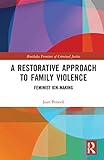A Restorative Approach To Family Violence : feminist kin-making / Joan Pennell.
Material type: TextSeries: Routledge frontiers of criminal justicePublication details: New York: Routledge, 2023.Edition: First Published 2023Description: 127 pages; 23 cmISBN:
TextSeries: Routledge frontiers of criminal justicePublication details: New York: Routledge, 2023.Edition: First Published 2023Description: 127 pages; 23 cmISBN: - 9780367612665
- 362.82/92 23/eng/20220121
- HV6626 .P413 2023
| Item type | Current library | Collection | Call number | Copy number | Status | Notes | Barcode | |
|---|---|---|---|---|---|---|---|---|
 Books
Books
|
Rabdan Academy General Stacks | General Collection | HV6626 .P413 2023 (Browse shelf(Opens below)) | C. 1 | Available | AED 442.00 | 21767 |
Browsing Rabdan Academy shelves,Shelving location: General Stacks,Collection: General Collection Close shelf browser (Hides shelf browser)

|

|

|

|

|

|

|
||
| HV6626 .G846 2023 Policing Domestic Abuse : risk, policy and practice / | HV6626 .G846 2023 Policing Domestic Abuse : risk, policy and practice / | HV6626 .G846 2023 Policing Domestic Abuse : risk, policy and practice / | HV6626 .P413 2023 A Restorative Approach To Family Violence : feminist kin-making / | HV6768 .B368 2022 Deconstructing Money Laundering Risk : de-risking, the risk-based approach and risk communication / | HV6768 .C994 2023 Cyber Laundering : international policies and practices / | HV6768 .G687 2023 Chief Executive Offenders and Economic Crime : a convenience theory approach / |
Includes bibliographical references and index.
"A Restorative Approach to Family Violence looks back at an early and successful demonstration of a family-and-culturally-based model to stop severe family violence. This conferencing model, called family group decision making, was applied by three diverse Canadian communities-Inuit, rural, and urban-to the benefit of child and adult family members. Narrative inquiry identifies how engaging the family and relatives resets the narrative from misrecognition to recognition of their competence and caring. Family violence poses some of the most long-term and controversial questions in restorative justice. Should we use a restorative approach to stop gendered and intergenerational harm? Or will bringing together those who have been harmed, those causing harm, and their supporters only incite more violence? Underlying these questions is a profound distrust of families and their cultural networks. This distrust has stalled turning away from carceral interventions that particularly harm minoritized communities. Moving forward in time, the volume identifies blocks to trusting families and their cultural networks and means of circumventing these blocks. The book offers a theory of feminist kin-making to comprehend the restorative process and gives practical guidance to restorative participants, practitioners, policy makers, and researchers"--
There are no comments on this title.
